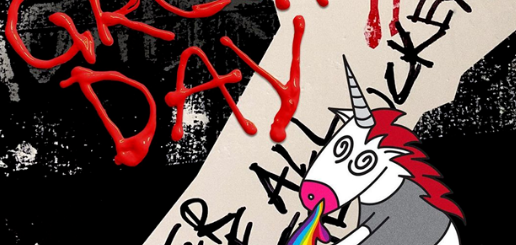Brain Stew by Green Day Lyrics Meaning – Exploring the Insomniac Anthem of a Generation
Lyrics
I’m counting sheep but running out
As time ticks by
And still I try
No rest for cross-tops in my mind
On my own, here we go
My eyes feel like they’re gonna bleed
Dried up and bulging out my skull
My mouth is dry
My face is numb
Fucked up and spun out in my room
On my own, here we go
My mind is set on overdrive
The clock is laughing in my face
A crooked spine
My senses dulled
Passed the point of delirium
On my own, here we go
My eyes feel like they’re gonna bleed
Dried up and bulging out my skull
My mouth is dry
My face is numb
Fucked up and spun out in my room
On my own, here we go
In the fervent landscape of ’90s punk rock, Green Day’s ‘Brain Stew’ emerged as a brutally honest reflection of insomnia and addiction. On the surface, the track’s chugging guitars and anguished lyrics resonate with the restlessness of a sleep-deprived mind, but closer inspection reveals layers of deeper significance that secure its position as an anthem for the anguished and the sleepless.
Released as the third single from their 1995 album ‘Insomniac’, ‘Brain Stew’ starkly contrasts the fizzing energy of its album companions, encapsulating a raw depiction of mental chaos. As we dissect this song’s haunting verses and unflinching chorus, the narrative behind the gritty lyrics exposes the unsettling quiet of the early morning hours, revealing much more than just a bout of sleeplessness.
The Relentless March of Insomnia
The song opens with a battle against slumber that anyone clawing at the sheets at 3AM can understand. ‘I’m having trouble trying to sleep,’ Billie Joe Armstrong confesses, setting the scene for an intimate journey into the woes of insomnia. Coupled with a repetitive guitar rhythm that mimics the monotonous turning of clock hands, these opening lines lay the foundation for a visceral experience of sleep deprivation and its accompanying mental turmoil.
As Armstrong ‘counts sheep but [is] running out,’ listeners are thrust into an empathy so tangible, it practically conjures the musty darkness of a bedroom imprisoning a restless mind. The ticking time reflects not just the literal progression of hours, but also the escalating urgency for rest that never comes, embodying an insomniac’s paradox of exhaustion and alertness.
An Eruption of Physical Discomfort
‘My eyes feel like they’re gonna bleed,’ Armstrong sings, the raw irritation of his voice paralleling the physical manifestations of his unease. The lyrics paint a vivid picture of physical agony emanating from a place of intense mental agitation, a blunt description that underscores the very real physical symptoms that accompany extreme sleeplessness.
Unlike romanticized notions of the tortured artist, Green Day offers no such illusions. Instead, the stark imagery of ‘dried up and bulging out my skull’ strips the experience to its bones, presenting an unfiltered snapshot of the self-destructive aftermath of continuous wakefulness. It’s a sensation that binds listeners in a shared consciousness of discomfort and defiance.
Diving into Mind’s Manic Overdrive
Central to ‘Brain Stew’s’ grappling hooks are the lines that illustrate a mind pushed to its limits: ‘On overdrive, the clock is laughing in my face.’ Here, the agony of Armstrong’s circumstances takes on a surreal quality, portraying time as a mocking adversary. The laugh of the clock signifies the mockery of the need for rest, turning a common struggle into a nightmarish reality where time and sleep seem to conspire against the sufferer.
In essence, the chorus isn’t only catchy but is also a clever encapsulation of the mental distortions that occur when the brain is denied its respite. The language twists and throbs with a kinetic energy that aptly mirrors the cerebral hyperactivity of one’s mind when overstimulated by the deprivation of slumber.
Unraveling the Song’s Hidden Ode to Resistance
What becomes increasingly evident with each frenzied repetition of ‘On my own, here we go’ is the song’s undercurrent of rebellion against one’s own biology. Green Day transforms a personal struggle with insomnia into a declaration of endurance, a battle cry for those who fight against the perceived betrayal of their bodies.
The angst-ridden emphasis on autonomy highlights a deeper meaning behind ‘Brain Stew’ — it’s not merely a description of insomnia but a testimonial of enduring the throes of chaos alone. It’s a solitary march through the trenches of night, a sentiment that echoes with any listener who has ever felt at war with their thoughts in the silence before dawn.
Memorable Lines That Shook a Generation
In the refrain of ‘Fucked up and spun out in my room,’ Green Day captures the essence of ’90s youth disillusionment. It’s a line that resonated powerfully with a generation grappling with the ennui of suburbia, the pressure of impending adulthood, and the alienation that so frequently coexists with mental health struggles.
As the song builds to its churning climax, every ‘my mouth is dry, my face is numb’ feels at once personal and universal. Armstrong’s ability to distil his restless angst into a series of punchy, unforgettable lyrics not only defined the era but continues to echo in the hearts of listeners who find solace in the shared acknowledgment of their hidden battles.








